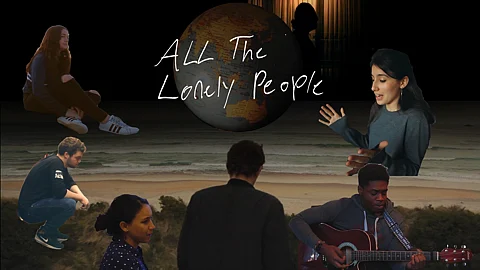
- HOME
- TRENDING
- PEOPLE
- COMMUNITY
- LIFESTYLE
- OUR PUBLICATIONSOUR PUBLICATIONS
- MASALA RECOMMENDS
- MASALAWEDS

Anyone who is invested in the world of cinema, be it significant players in the industry, YouTube film pundits, or cinephiles, will tell you that making a good film is a nearly impossible mission. However, it becomes an entirely different, herculean task to make a decent film with no budget and have it land on one of the world’s biggest streaming platforms, Amazon Prime Video. Thai-Indian filmmaker, based in New York, Nihal Singhsachathet, recently proved that it could absolutely be done with his feature film All The Lonely People (2023), a collection of seven stories capturing the lives of people attempting to overcome life’s everyday struggles. I had the pleasure to sit down with a promising talent hoping to share his work of art with the whole world, and hopefully leave a lasting impression in the film industry.
You must be thrilled to have your feature film landing on Amazon. How did you find out, what was your initial reaction?
It feels incredibly surreal. I had to do all the legwork to get this film where it is today. In fact, I’m still in discussion with companies to secure distribution. Unfortunately, the film isn’t being streamed in Asia, so that’s a priority at the moment. It’s a funny process because they don’t email or notify you that the film has been released; you’re left to find out for yourself. I happened to check for it as I was falling asleep and genuinely felt it wasn’t real. I thought I would wake up the next morning, and it would have been just a dream. But there it was. It was honestly the most beautiful thing. All of a sudden, my work was being taken seriously.
When did you know you had something truly special in your hands?
I always rely on my sensibility and intuition to know when something is done. But I have also found that screening something for fresh eyes is a very important part of the process. I defer to my parents very often. I grew up around my mother watching Bollywood movies and shared a few Hollywood ones with my father. So, early on, I would always show my work to my mother; she has always been a really good test audience. She’s very stringent when it comes to critiquing work. When she saw All The Lonely People, she said, “I was looking for something wrong, but I couldn’t find it.” I was stunned. She’s very sophisticated in these matters, but her tastes are what they are. She’s not going to bend her tastes for you, no matter who you are.
You shot the film in multiple cities around the world. What motivated you to approach the film in this manner?
In the earlier years, I was obsessed with Jean-Luc Godard (French filmmaker) and even the story of Sean Baker (writer and director of Oscar-winning Anora), on how he started off on an iPhone. I think the naivety of youth made me believe, “Oh, I could try that.” I was determined to make this film, so I read many books about short stories, leaned on my own ‘international’ exposure through school and friends, and it all just fell into place. That had to be the concept for the film: seven different people are lonely in completely different environments such as New Zealand, London, Bangkok, and so on. Fortunately, the subjects in the film are all my friends from my years at the International School of Bangkok. I was able to focus on their strengths as a performer, which made the filming more organic. Making this film, in a way, was kind of taking control of the narrative and showing the world as we had experienced it.
That’s quite a diverse cast you have. We’re starting to see more representation on the big screen, how important is that for you, being a Thai-Indian, creating films for a global audience?
For me, it’s more than just a cultural aspect or representation. It’s about authenticity. For example, I wanted to make a film about how it really was for me in high school. The films we saw of the American high school experience were far removed from our experience in Thailand. On the other hand, there are big blockbusters with roles reserved for Indians but it feels like they just shoehorned the actor in for the sake of it. Why? You could have easily searched for a better actor for that role. Then again, we’re able to make films now that we couldn’t five years ago. You have to take the good with the bad when it comes to the movement of diversity.
But it’s important to bridge the gap. All The Lonely People gave us the space to uncover the universal truths within our stories—to show that even in moments in loneliness, confusion, or feeling adrift, there’s a shared thread of humanity that connects us all.
What’s next on the credits list?
I’ve got a few script ideas pasted on my wall. But the most pressing project right now is shooting music videos; this will keep me engaged until I can work on the next feature in a year or two. However, this time, a little bit of money in the budget would be nice [chuckles].All The Lonely People was definitely a learning experience, and I felt proudly of what I was able to accomplish without financial backing but it’s not something I would want to endure for the second time. Ultimately, I want to explore what New York has to offer right now. It’s almost turning into Los Angeles, where every block feels like a movie set. I’m letting life here guide me where I need to be rather than imposing myself on how I would do things my way.
Spoken like a true artist.